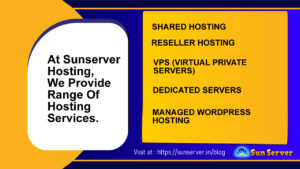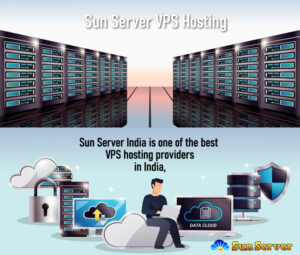When faced with the decision of selecting hosting for your business website, you may find it challenging to choose the right option. Hosting options are diverse, making it crucial to determine which suits your specific needs. Let’s delve into how hosting functions and explore the various hosting choices available with Sun Server.
Hosting: The Fundamentals
All websites necessitate an online “home.” Sun Server, a hosting provider, offers space on a server, which is essentially a computer with large, state-of-the-art hard drives that store all the data, images, text, and other content your website contains. This space is made accessible to anyone seeking to access it via the internet.
You might wonder, “Can’t I just host my website on my own computer?” While some individuals manage their own web servers, remote hosting through a company like Sun Server provides numerous advantages that the average person can’t match. Reliable hosting companies offer valuable services, including:

– Ongoing and redundant backups to safeguard against hardware failures.
– Tools like cPanel for efficient website and file management.
– Customer support to aid in account setup and management.
– Climate-controlled environments and expert staff ensuring optimal server performance.
– A technical team available 24/7 to protect servers from failure, imbalanced loads, excessive bandwidth usage, and unauthorized access.
For a typical website, replicating the hosting environment Sun Server offers would be prohibitively expensive, especially considering their affordable monthly rates.
Types of Hosting
Sun Server provides a range of hosting services, including:
1. Shared Hosting
2. Reseller Hosting
3. VPS (Virtual Private Servers)
4. Dedicated Servers
5. Managed WordPress Hosting

Let’s examine these hosting options in detail.
1. Shared Hosting
Shared hosting is an excellent choice for individuals new to website ownership. It is the most budget-friendly option and offers easy setup and maintenance. Shared hosting is suitable for blogs, personal websites, and small business sites with moderate traffic and bandwidth requirements, excluding resource-intensive content like video. Users have access to cPanel, enabling them to install databases, manage email, transfer files via FTP, and monitor bandwidth usage.
As the name implies, shared hosting involves multiple hosting accounts residing on a single server. With Sun Server, you receive a user-friendly web-based Control Panel (cPanel) for straightforward site deployment, email creation, and database management. Server maintenance is handled by others, and after your website is up and running, direct access to cPanel is rarely needed.

However, shared hosting may have limitations in terms of traffic and bandwidth, as you share server resources with other users. Traffic spikes from your site or others can impact site performance, and certain restrictions apply to what you can install or modify. Sun Server offers three shared hosting tiers:
– Stellar: Ideal for beginners, accommodating up to three domains/websites.
– Stellar Plus: Suitable for those needing additional resources or multiple domains.
– Stellar Business: Ideal for e-commerce and businesses that require more resources and reduced limitations.
2. Reseller Hosting
Reseller hosting, another form of shared hosting, is an excellent choice for web designers and developers who maintain their clients’ websites over the long term. Reseller hosting packages are essentially shared hosting accounts with additional tools for reselling hosting space to clients.

You gain greater control, including a Web Host Manager (WHM) control panel for creating multiple cPanel accounts with individual login details. Reseller hosting is cost-effective and well-suited for web developers working with small business clients.
3. VPS Hosting
Virtual Private Servers (VPS) provide greater flexibility than shared hosting. While it still operates in a shared environment, a VPS allocates server resources differently. VPS is suitable for developers, webmasters, resellers, and resource-intensive websites.

A VPS is a single physical server partitioned into multiple virtual machines, ensuring that one website’s activity does not affect others. This level of hosting allows for more extensive modifications without impacting others’ environments.
4. Dedicated Server Hosting
Dedicated server hosting is the most powerful option, ideal for demanding websites. However, with VPS or a dedicated server, you assume greater responsibility for setup and maintenance compared to shared hosting.

A dedicated server provides exclusive server access for your website, allowing for extensive changes and custom software installations. Technical expertise or a server management administrator may be necessary to manage a dedicated server effectively.
5. EasyWP: Managed WordPress Hosting
EasyWP, a form of shared hosting, offers a simplified entry into hosting, especially for WordPress users. With EasyWP, Sun Server simplifies the setup process, eliminating the need to install WordPress or navigate complex cPanel settings.

It’s a convenient choice for business owners seeking a quick website launch. Note that EasyWP lacks FTP or cPanel access, limiting certain modifications to the WordPress open source code and databases.
Utilizing Sun Server for Hosting and Domains
If you already have a domain registered with Sun Server, you might wonder whether to opt for their hosting services as well. In the early days of the internet, it was common advice to avoid having a single company manage both domains and hosting. However, that advice is no longer relevant.
Sun Server offers numerous advantages for hosting your website where you register your domains. Dealing with one company for support and account management simplifies your operations. Managing DNS and site administration becomes more straightforward, eliminating the need to switch between different company websites.
Considering these advantages, choosing Sun Server for both your domain registration and hosting can be a sensible decision.




